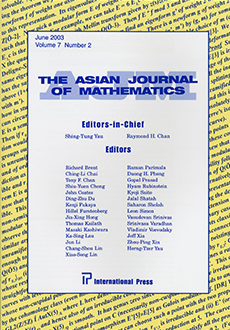Abstract
Let $k$ be any field, $G$ be a finite group acting on the rational function field $k(x_g : g \in G)$ by $h \cdot x_g = x_{hg}$ for any $h, g \in G$. Define $k(G) = k(x_g : g \in G)^G$. Noether's problem asks whether $k(G)$ is rational (= purely transcendental) over $k$. It is known that, if $\mathbb{C}(G)$ is rational over $\mathbb{C}$, then $B_0(G) = 0$ where $B_0(G)$ is the unramified Brauer group of $\mathbb{C}(G)$ over $\mathbb{C}$. Bogomolov showed that, if $G$ is a $p$-group of order $p^5$, then $B_0(G) = 0$. This result was disproved by Moravec for $p = 3, 5, 7$ by computer calculations. We will prove the following theorem. Theorem. Let $p$ be any odd prime number, $G$ be a group of order $p^5$. Then $B_0(G) \neq 0$ if and only if $G$ belongs to the isoclinism family ${\Phi}_{10}$ in R. James's classification of groups of order $p^5$.
Citation
Akinari Hoshi. Ming-Chang Kang. Boris E. Kunyavskii. "Noether's problem and unramified Brauer groups." Asian J. Math. 17 (4) 689 - 714, November 2013.
Information





